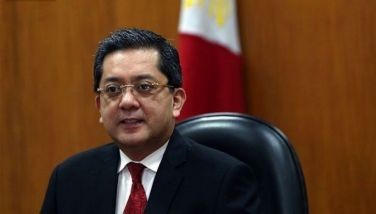Unicef wants stronger RP laws vs child porn
April 6, 2005 | 12:00am
The United Nations Children’s Fund (Unicef) called on the Philippine government yesterday to strengthen its laws against child pornography, a hidden but growing social problem in the country.
At the launching of Unicef’s new study titled "Child Pornography in the Philippines," Unicef executive director Carol Bellamy said the Philippines should study both the "supply and demand" sides of child pornography for it to come up with the right approach to the problem.
The fight against this global social issue won’t be easy, Bellamy said.
"We are dealing with criminals and they are not stupid. There’s lots of money to be made and they will go to any length to continue harming and exploiting children in this awful way," she said at a press conference in Shangri-La Hotel in Makati City.
"I am glad that I could come to the Philippines to assist in this timely and compelling study on a deeply distressing challenging form of exploitation of children," said Bellamy, who is in the country to join the 112th Inter-Parliamentary Union general assembly.
The Unicef official stressed that children and their parents need governments to make good laws and beef up investigative work, while educating the people on this $10-billion global dilemma.
The Unicef commissioned the study with the program on psychosocial trauma and human rights of the University of the Philippines’ Philippine Center for Integrative and Developmental Studies conducting the investigation.
Its recommendations include forging stronger international cooperation between countries worldwide and enacting up-to-date and specific laws defining and penalizing child pornographers, as well as revising existing legislations.
One of the most worrisome findings in the study is the link between local producers and networks of pornographers operating overseas for the purpose of distributing child pornography over the world wide web.
The study notes the Philippines should determine the culpability of Internet service providers (ISPs), set uniform and substantial penalties for child pornographers, and keep Filipino children in school by fighting poverty.
Bellamy said the study details the way Internet technology makes it difficult for officials to monitor and probe this illegal act that depicts minors in sexual or indecent acts.
The study also notes unsupervised Internet use by children especially in Internet cafés leaves them vulnerable to child pornographers via e-mail, chat rooms, web cameras and various web sites.
Digital cameras and mobile phones equipped with cameras are also reportedly being used to produce and disseminate child pornography.
Bellamy is likewise frustrated with local ISPs which have been totally uncooperative in telling what they know of suspected pornographers and pedophiles in the country.
Bellamy said they have found extensive evidence that child pornography is occurring in the country as a result of both foreign and domestic perpetrators seeking to exploit poor and vulnerable families and children.
However, the study failed to exactly determine the extent of child pornography in the Philippines because such incidents are seldom reported.
UP professor Elizabeth Protacio-De Castro said they did not get to dig deeper into the involvement of ISPs in the proliferation of the problem.
Not one of the ISP companies, and not even credit card firms would talk to their investigating team, she said.
The Unicef-UP study, according to De Castro, is the first of its kind in Asia but he pointed out that Philippine laws "are behind."
Bellamy, on the other hand, noted that the Philippines had made "a dent in the fight against trafficking of women and children."
In her speech at the IPU conference at the Philippine International Convention Center in Pasay City, the Unicef official said she was impressed that the country had an anti-trafficking law.
For her part, Social Welfare Secretary Dinky Soliman said child pornography is a problem that stems from the failure of adults, especially parents, to keep a close eye on children.
Soliman disclosed that once when she joined a recent raid against a "cyber-sex den," some of the women found engaging in Internet sex were underage.
These girls, she said, had no clue that what they were doing was illegal as they kept asking law enforcers what crime they had committed.
"This is not the responsibility of the government alone. It’s everybody’s responsibility," Soliman said.
Meanwhile, Senate President Franklin Drilon urged the Department of Foreign Affairs yesterday to support the creation of a human rights council in the United Nations. — With Pia Lee-Brago, Christina Mendez
At the launching of Unicef’s new study titled "Child Pornography in the Philippines," Unicef executive director Carol Bellamy said the Philippines should study both the "supply and demand" sides of child pornography for it to come up with the right approach to the problem.
The fight against this global social issue won’t be easy, Bellamy said.
"We are dealing with criminals and they are not stupid. There’s lots of money to be made and they will go to any length to continue harming and exploiting children in this awful way," she said at a press conference in Shangri-La Hotel in Makati City.
"I am glad that I could come to the Philippines to assist in this timely and compelling study on a deeply distressing challenging form of exploitation of children," said Bellamy, who is in the country to join the 112th Inter-Parliamentary Union general assembly.
The Unicef official stressed that children and their parents need governments to make good laws and beef up investigative work, while educating the people on this $10-billion global dilemma.
The Unicef commissioned the study with the program on psychosocial trauma and human rights of the University of the Philippines’ Philippine Center for Integrative and Developmental Studies conducting the investigation.
Its recommendations include forging stronger international cooperation between countries worldwide and enacting up-to-date and specific laws defining and penalizing child pornographers, as well as revising existing legislations.
One of the most worrisome findings in the study is the link between local producers and networks of pornographers operating overseas for the purpose of distributing child pornography over the world wide web.
The study notes the Philippines should determine the culpability of Internet service providers (ISPs), set uniform and substantial penalties for child pornographers, and keep Filipino children in school by fighting poverty.
Bellamy said the study details the way Internet technology makes it difficult for officials to monitor and probe this illegal act that depicts minors in sexual or indecent acts.
The study also notes unsupervised Internet use by children especially in Internet cafés leaves them vulnerable to child pornographers via e-mail, chat rooms, web cameras and various web sites.
Digital cameras and mobile phones equipped with cameras are also reportedly being used to produce and disseminate child pornography.
Bellamy is likewise frustrated with local ISPs which have been totally uncooperative in telling what they know of suspected pornographers and pedophiles in the country.
Bellamy said they have found extensive evidence that child pornography is occurring in the country as a result of both foreign and domestic perpetrators seeking to exploit poor and vulnerable families and children.
However, the study failed to exactly determine the extent of child pornography in the Philippines because such incidents are seldom reported.
UP professor Elizabeth Protacio-De Castro said they did not get to dig deeper into the involvement of ISPs in the proliferation of the problem.
Not one of the ISP companies, and not even credit card firms would talk to their investigating team, she said.
The Unicef-UP study, according to De Castro, is the first of its kind in Asia but he pointed out that Philippine laws "are behind."
Bellamy, on the other hand, noted that the Philippines had made "a dent in the fight against trafficking of women and children."
In her speech at the IPU conference at the Philippine International Convention Center in Pasay City, the Unicef official said she was impressed that the country had an anti-trafficking law.
For her part, Social Welfare Secretary Dinky Soliman said child pornography is a problem that stems from the failure of adults, especially parents, to keep a close eye on children.
Soliman disclosed that once when she joined a recent raid against a "cyber-sex den," some of the women found engaging in Internet sex were underage.
These girls, she said, had no clue that what they were doing was illegal as they kept asking law enforcers what crime they had committed.
"This is not the responsibility of the government alone. It’s everybody’s responsibility," Soliman said.
Meanwhile, Senate President Franklin Drilon urged the Department of Foreign Affairs yesterday to support the creation of a human rights council in the United Nations. — With Pia Lee-Brago, Christina Mendez
BrandSpace Articles
<
>
- Latest
- Trending
Trending
Latest
Trending
Latest
Recommended



























